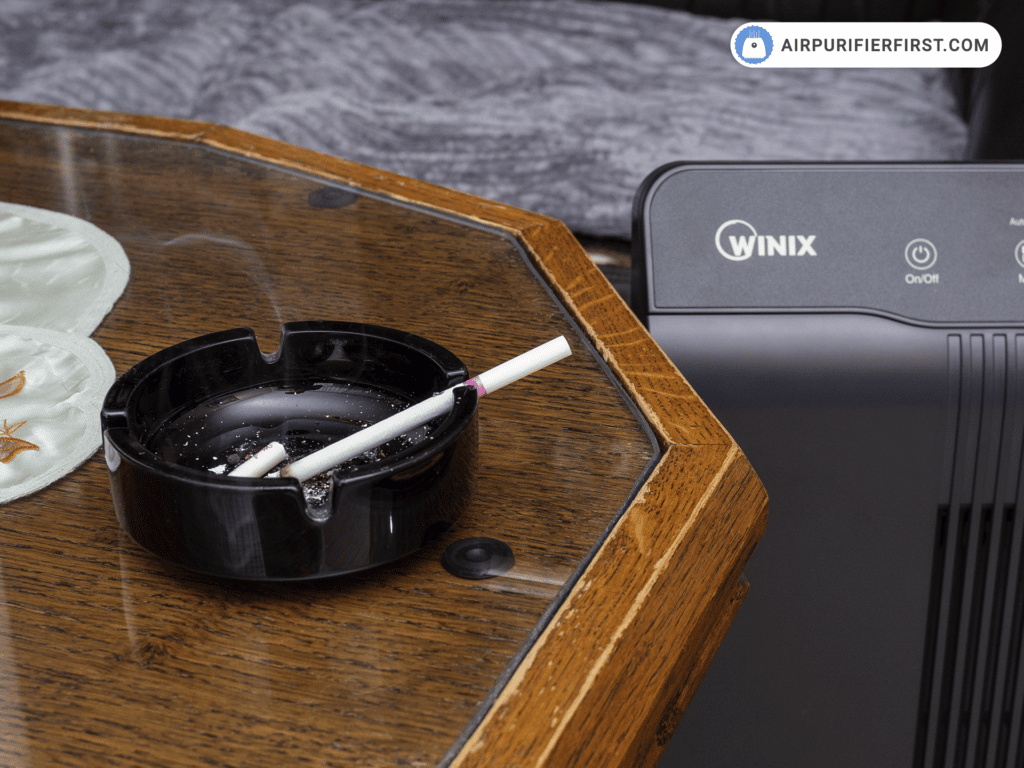What Type of Air Purifier is Best for Smoke

Smoke can linger in the air, causing health issues and discomfort. The right air purifier can help eliminate smoke effectively.
Breathing in smoke can be harmful, whether it’s from wildfires, cigarettes, or cooking. Having an efficient air purifier is crucial for maintaining clean indoor air. Air purifiers come in various types, each designed to tackle different pollutants. When dealing with smoke, some models perform better than others.
Understanding which type is best can make a significant difference in air quality. This blog post will guide you through the best air purifier options for smoke, ensuring you make an informed choice for a healthier home environment.

Credit: housefresh.com
Types Of Air Purifiers
Choosing the right air purifier for smoke can be tricky. Different types of purifiers offer different benefits. Understanding these types can help you make an informed decision. Below are some common types of air purifiers that can be effective against smoke.
Hepa Filters
HEPA filters are popular for their ability to trap small particles. They can capture 99.97% of particles as small as 0.3 microns. This includes smoke particles, making them highly effective. HEPA filters are great for improving air quality in homes with smoke issues.
Activated carbon filters are another excellent choice for smoke. These filters contain tiny pores that trap gases and odors. They absorb smoke particles and improve air quality. They are often used with HEPA filters for better results.
Ozone generators are less common but can be effective. They release ozone into the air, which reacts with smoke particles. This can reduce smoke odors. However, ozone can be harmful if not used correctly. Always follow the manufacturer’s instructions.
Ionizers release negative ions into the air. These ions attach to smoke particles, causing them to fall to the ground. This can reduce the amount of smoke in the air. Ionizers are less effective than HEPA or carbon filters but can be a good supplementary option.
| Type of Air Purifier | Effectiveness | Best For |
|---|---|---|
| HEPA Filters | High | Trapping small particles |
| Activated Carbon Filters | High | Absorbing gases and odors |
| Ozone Generators | Moderate | Reducing smoke odors |
| Ionizers | Low to Moderate | Supplementing other filters |
Each type of air purifier has its advantages. Choose the one that best fits your needs.
Hepa Filters For Smoke
Smoke can be a major indoor air pollutant. It affects air quality and health. HEPA filters are excellent for removing smoke particles. These filters capture tiny particles, making the air cleaner and safer.
Effectiveness
HEPA filters stand for High-Efficiency Particulate Air filters. They can trap particles as small as 0.3 microns. This includes smoke particles. The filter’s fine mesh captures smoke, dust, and pollen. This makes it ideal for homes with smokers or near wildfire areas. HEPA filters can remove up to 99.97% of airborne particles. This level of effectiveness ensures cleaner and healthier air.
| Particle Type | Size (Microns) | HEPA Filter Efficiency |
|---|---|---|
| Smoke | 0.3 | 99.97% |
| Dust | 0.5 | 99.97% |
| Pollen | 10 | 99.97% |
Maintenance
Regular maintenance is key for HEPA filters. Check the filter every three months. Replace it if it looks dirty. Some filters are washable. Follow the manufacturer’s instructions for cleaning. A clean filter works better and lasts longer. This ensures continued effectiveness in removing smoke particles.
Consider these tips for maintaining your HEPA filter:
- Check the filter every three months.
- Replace dirty filters promptly.
- Follow cleaning instructions for washable filters.
- Use a vacuum to remove surface dust.
- Keep the air purifier in a smoke-prone area.
Activated Carbon Filters
Activated carbon filters are highly effective in removing smoke particles from the air. These filters use a bed of activated carbon to trap harmful pollutants. The carbon has many tiny pores, which capture smoke and other particles. This makes the air cleaner and safer to breathe. Let’s explore how these filters work and their maintenance.
Smoke Absorption
Activated carbon filters excel at absorbing smoke. The porous carbon material captures smoke particles efficiently. This is due to its large surface area. As air passes through, the filter traps the smoke. This reduces odors and harmful chemicals in the air.
The process is simple but effective. The carbon attracts and holds onto smoke particles. This makes it one of the best choices for smoke removal. Many air purifiers use activated carbon filters for this reason.
Filter Replacement
Replacing activated carbon filters regularly is important. Over time, the filter becomes saturated with smoke particles. When this happens, it can no longer trap new particles effectively. Check the manufacturer’s guidelines for replacement intervals. Typically, replace the filter every 3 to 6 months.
Replacing the filter is usually straightforward. Most air purifiers have easy-to-access compartments. Simply remove the old filter and insert a new one. This ensures the air purifier continues to work efficiently. Maintaining the filter helps keep your air clean and free of smoke.
Ozone Generators
Ozone generators are a type of air purifier that uses ozone to remove pollutants. Ozone, a molecule made of three oxygen atoms, is a powerful oxidizing agent. These devices are often marketed for their ability to eliminate odors, including smoke. But are they the best choice for smoke removal? Let’s dive into the details.
Pros And Cons
Ozone generators have their share of advantages and disadvantages. Understanding these can help you decide if they are suitable for your needs.
| Pros | Cons |
|---|---|
|
|
Health Considerations
Ozone generators can pose several health risks. Ozone, while effective at odor removal, can irritate the respiratory system. Exposure to high levels of ozone can lead to coughing, throat irritation, and shortness of breath.
People with asthma or other respiratory conditions are particularly at risk. Ozone can worsen their symptoms. It’s important to use these devices in unoccupied spaces. Ensure proper ventilation when in use. Always follow the manufacturer’s guidelines.
Given these health considerations, it’s essential to weigh the pros and cons carefully. Ensure the safety of your household before opting for an ozone generator.
Ionizers
Ionizers are a type of air purifier that can help remove smoke. They are popular for their ability to tackle airborne particles. But how do they work? And are they safe? Let’s dive into these questions.
How They Work
Ionizers work by releasing negative ions into the air. These ions attach to smoke particles. The particles then become heavy and fall to the ground. This process helps to clear the air of smoke.
Some ionizers have a collection plate. The plate attracts the charged particles, trapping them. This keeps the particles from re-entering the air. The result is cleaner, fresher air.
Safety Concerns
While ionizers can be effective, they do have safety concerns. One concern is the production of ozone. Ozone can be harmful if inhaled in large amounts. It’s important to choose an ionizer that produces low levels of ozone.
Another concern is the effectiveness of ionizers alone. They may not capture all smoke particles. Using an ionizer with a HEPA filter can improve results. Always read the product specifications. This ensures you select a safe and effective model.

Credit: www.calarestaurante.com
Combining Technologies
Combining technologies is key for effective smoke removal. Single-method air purifiers often fall short. Smoke particles are tiny. They also contain harmful chemicals. Using multiple technologies ensures better air quality. This approach targets different pollutants. It maximizes the purifier’s efficiency. Let’s explore how hybrid purifiers combine technologies.
Hybrid Purifiers
Hybrid purifiers use multiple filters. They often combine HEPA and activated carbon filters. HEPA filters capture tiny smoke particles. Activated carbon filters remove odors and chemicals. Some hybrids also use UV-C light. This kills bacteria and viruses. Combining these technologies makes hybrids very effective. They provide cleaner and healthier air.
Efficiency
Hybrid purifiers offer higher efficiency. Each technology targets specific pollutants. HEPA filters trap fine particles. Activated carbon filters absorb gases and odors. UV-C light kills germs. Together, they tackle smoke comprehensively. This leads to better air purification. It ensures your home is smoke-free. And it improves air quality significantly.
Factors To Consider
Choosing the right air purifier for smoke involves considering various factors. Each factor impacts the effectiveness and convenience of the air purifier. Below are some crucial elements to weigh before making a decision.
Room Size
The size of the room is a vital consideration. A small air purifier will not work well in a large room. Make sure to check the coverage area mentioned by the manufacturer. Here is a simple guide:
- Small rooms (up to 150 sq. ft.)
- Medium rooms (150-300 sq. ft.)
- Large rooms (300+ sq. ft.)
Match the purifier’s capacity with your room size for optimal results.
Filter Life
Filter life is another key factor. Frequent replacements can be costly. Check the recommended duration for changing filters. Typical lifespans include:
- HEPA filters: 6-12 months
- Activated carbon filters: 3-6 months
Some purifiers come with washable filters, which can be more economical. Consider the cost and frequency of filter replacements before purchasing.
Noise Levels
Air purifiers can be noisy, especially in high settings. Noise levels are measured in decibels (dB). For a quiet environment, look for purifiers with noise levels below 50 dB. Here is a quick reference table:
| Noise Level (dB) | Sound Description |
|---|---|
| 30-40 dB | Quiet, like a whisper |
| 40-50 dB | Moderate, like a library |
| 50+ dB | Loud, like a conversation |
Select a purifier that balances efficiency with low noise levels.

Credit: www.breathenaturally.com
Expert Recommendations
Choosing the right air purifier for smoke can be tricky. Experts agree that some models stand out for their effectiveness. These air purifiers excel in removing smoke particles from the air. Let’s explore the top recommendations from experts.
Top Brands
Several brands are well-known for their high-quality air purifiers. Dyson, known for its advanced technology, offers models specifically designed to handle smoke. Another top brand is Honeywell. Their air purifiers are reliable and efficient. Levoit also makes popular models that are budget-friendly and effective. Each of these brands has a strong reputation for producing air purifiers that work well against smoke.
User Reviews
Users often share their experiences with air purifiers. Many praise the Dyson models for their sleek design and powerful performance. Honeywell users appreciate the durability and effectiveness of their units. Levoit air purifiers receive positive feedback for their affordability and efficiency. Reading user reviews can provide real-world insights and help you make an informed decision. Always consider both positive and negative reviews to get a balanced view.
Conclusion
Choosing the best air purifier for smoke can be challenging. HEPA filters are highly effective. They trap smoke particles, improving air quality. Activated carbon filters remove odors. Both types work well together. Consider room size before buying. Larger rooms need stronger purifiers.
Always check filter replacement costs. Regular maintenance ensures optimal performance. With the right choice, you’ll breathe easier and stay healthier.
